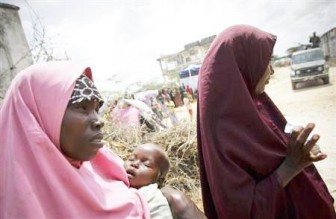NAIROBI, (Reuters) – The United Nations said yesterday two regions of southern Somalia had been hit by the worst famine in the area for 20 years and that 3.7 million people in the anarchic Horn of Africa nation risked starvation.

“If we don’t act now, famine will spread to all eight regions of southern Somalia within two months, due to poor harvests and infectious disease outbreaks,” Mark Bowden, the humanitarian coordinator for Somalia, told a media briefing in the Kenyan capital, Nairobi.
“Every day of delay in assistance is literally a matter of life or death for children and their families in the famine-affected areas.” Some 2.8 million Somalis live in the south.
Years of drought, that have also affected Kenya and Ethiopia, have hit harvests and conflict has made it extremely difficult for agencies to operate and access communities in the south of the country.
Much of southern and central Somalia is controlled by Islamist militants linked to al Qaeda who imposed a ban on food aid in 2010, which the U.N. and the United States said had exacerbated the crisis. The rebels lifted the ban this month.
In the worst-affected areas, half the children are malnourished. “It is likely that tens of thousands will already have died, the majority of those being children,” Bowden said.
The U.N. declared famine in Somalia’s southern Bakool and Lower Shabelle regions. The agency is poised to launch its largest ever relief effort, Bowden said.
U.S. Secretary of State Hillary Clinton pledged an extra $28 million in aid but international charities have criticised the slow response of many Western governments to funding an estimated $800 million shortfall.
The U.N. was exploring ways of providing “cash relief” while it finds ways of getting larger volumes of food aid into southern Somalia, Bowden said. The global body has appealed for $300 million over the next two months for Somalia.
Josette Sheeran, head of the U.N.’s World Food Programme which had halted its aid operations after the rebel-imposed ban, said this would be its “largest ever emergency operation of supplementary foods to reach children”.
The agency appealed yesterday for an extra $500 million on top of the $7.4 billion it originally sought for 2011 to fund relief operations in the face of spreading humanitarian crises in Africa and Asia.
CRISIS “WILL GET
WORSE”
The south is controlled by al Shabaab Islamist insurgents, affiliated to al Qaeda, who are fighting to topple the Western-backed government. The group also controls parts of the capital Mogadishu and central Somalia.
In early July, the rebels lifted a ban on food aid which they had said created dependency. Some analysts say they are allowing aid in because they fear a public backlash if they do not. Others say the rebels want bribes. Clinton said Washington was “cautiously optimistic” al Shabaab would allow unrestricted access to famine-hit areas.
The U.N. has said the inability of food agencies to work in the region because of the ban had contributed to the crisis.




